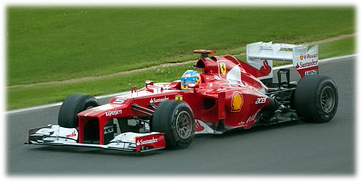There are many types of automobile races that attract adrenaline-pumped crowds. We have everything from stock cars and motorcycles, to muscle cars and monster trucks. They all garner modest appeal from the general public, but none quite so much as the world’s most popular form of racing, Formula One.
 The cars that compete in these races come from a whole different breed of vehicular innovation. Formula One is generally considered the most sophisticated class of auto racing, especially popular in European cultures, where a typical, mid-tier car can cost around USD $120 million to fabricate.
The cars that compete in these races come from a whole different breed of vehicular innovation. Formula One is generally considered the most sophisticated class of auto racing, especially popular in European cultures, where a typical, mid-tier car can cost around USD $120 million to fabricate.
These aren’t your standard racing vehicles, by any means. They are custom built from start to finish, with a single, compact seat and enough aerodynamic physics to reach speeds of 240+ mph, even around turns. If a stock car tried that, it would spin over the stands faster than a tornado roaring through the Texas Panhandle.
Monetization via Formula One Betting
However, viewership of these exalted races fell 5.6% from 2014 to 2015. In the previous year, it was estimated that 425 million fans tuned in to Formula One racing across the globe. 5.6% may seem like a small percentage, but that figure represents about 25 million viewers who stopped tuning in.
US-based broadcasting conglomerate Liberty Media, who recently invested heavily enough in Formula One to become the majority stakeholder, is looking for new ways to monetize the industry, and among the topics raised was the concept of betting on Formula One, much the way we already bet on horse racing.
Increasing marketing efforts is certainly an option, but the decline in viewership isn’t being blamed on a descent in popularity, but rather a shift towards “pay TV” programming, as opposed to televising races on public broadcasting channels.
The idea behind moving Formula One to a pay-TV model was also a marketing tactic to better monetize the industry, and despite the somewhat diminished viewership, the intended effect was successful. According to Liberty Media CEO Greg Maffei in a statement to Goldman Sachs Communicopia, even without those 25 million viewers, the racing circuit experienced a YoY increase in revenue.
Maffei is determined that the auto racing industry can be further monetized through digital outlets, such as virtual reality and augmented reality. He noted that “less than one percent of revenues are from digital”, and that there’s lots a room to grow in that area.
Push to Legalize Betting on Formula One in US
“Outside of the United States there is a huge gambling opportunity in the sport, none of which we capitalize on,” Maffei continued. “There’s an enormous amount of video feed and data about the races that we are already capturing that we are not in any way processing incrementally for the dedicated fan, or opportunities around things like gambling.”
But as Maffei clarified, Formula One betting is not legal in the US – a prime market for such a lucrative opportunity, and one where there’s plenty of room for the popularity of the sport to expand. By his way of thinking, if Americans could start betting on Formula One, the rate of fans and viewership would rise naturally.





